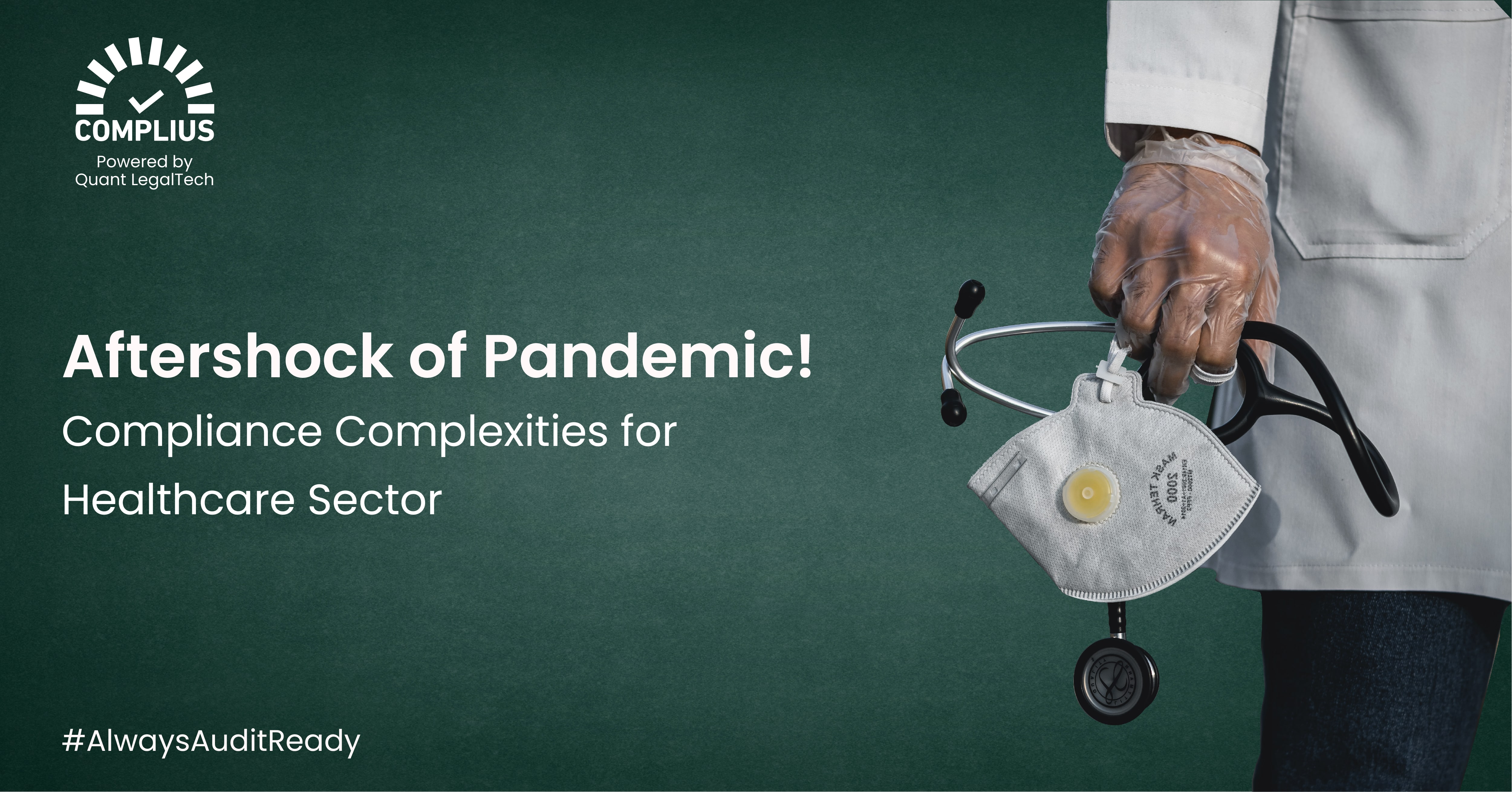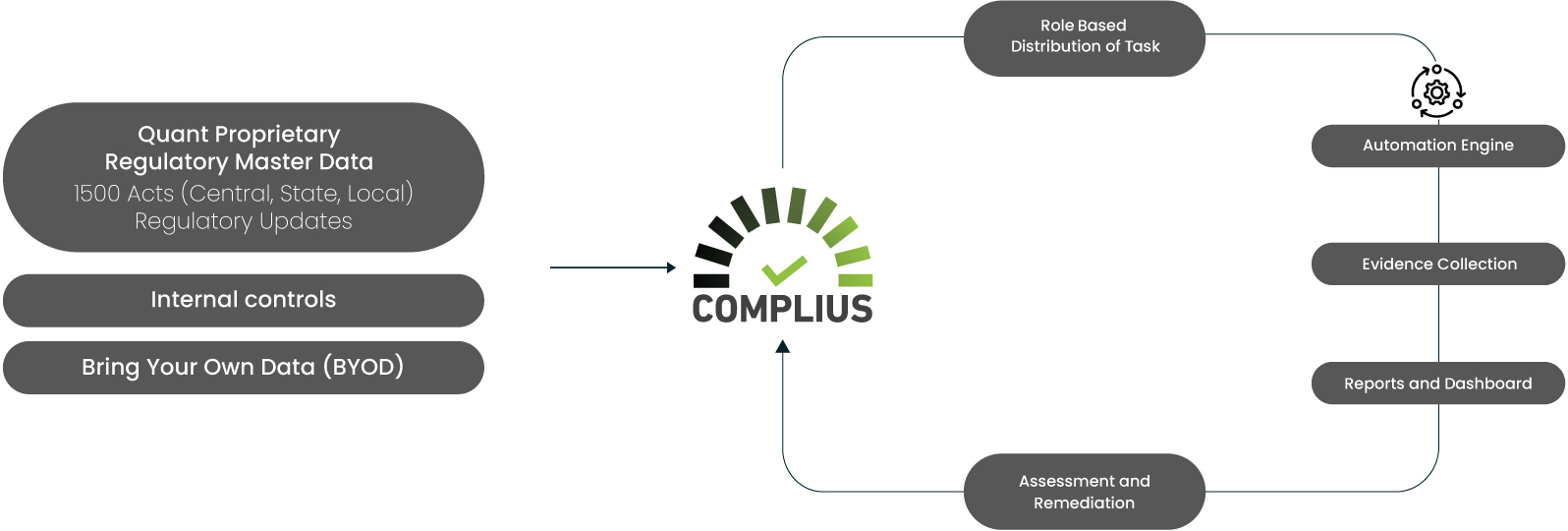Choose another country or region to see content specific to your location
Aftershock of the Pandemic – Compliance Complexities for Healthcare Sector
May 18, 2022

The Healthcare industry has been at the forefront of the fight against the Covid pandemic. The suddenness of the onset and the unimaginable rapidity of its spread has exposed the fragility of the healthcare system, not just in India, but globally as well. The system was overburdened with infrastructure, resources, operability, and human capital being stretched to the point of snapping. Dealing with an unknown pandemic also meant working in a highly regulated environment under guidance from the government with ICMR and WHO playing watchdog.
The SOPs were ever-changing, and thereby the need to comply. The scars left behind on the system are visible. The learning has been enormous and so are the operational and regulatory changes to the way healthcare functions. Take the case of the Telemedicine Practice Guidelines. During the first two waves of the pandemic, patients with mild symptoms or just in panic were encouraged to call doctors instead of opting for in-person consultations in hospitals for obvious reasons. This led to a significant demand for telemedicine. e-Sanjeevani, India’s official telemedicine service, alone clocked in a staggering 1.4 crore consultations. To regulate the sudden surge and error-proof the process, the Ministry of Health and Family Welfare had to issue these Guidelines in 2020.
If this was not enough mayhem, the system was advised to hold off on non-life-threatening treatments, surgeries, and admissions. All these changes triggered innumerable regulatory compliances to manage the pandemic and prevent its spread. Non-compliance, in this case, was out of the question.
Regulatory Changes in Healthcare
It is a well well-known fact that the pandemic is here to stay and so shall the stringent regulations in this highly critical sector.
The healthcare system was not built to handle anything of the scale of the Covid Pandemic. So, it is only natural that fragility got exposed in every aspect of the healthcare system. For example, Hospitals had to battle severe shortages of COVID care medicines, PPE Kits, intensive care unit beds, and more importantly oxygen cylinders. Around April 2021, the National Panel responded to the looming oxygen crisis and mandated the installation of oxygen plants in hospitals and healthcare centers with 50 beds. The same was implemented with immediate effect without any exception. Defaulters were reprimanded and several private hospitals were served notices for not installing oxygen plants within the stipulated time.
Health insurance has been another area with massive regulatory impacts. Take the case of telemedicine. In the wake of the COVID-19, the Insurance Regulatory and Development Authority of India directed insurers to include telemedicine in their healthcare policies. Having said that, the government has clearly called out the need for the entire service delivery to be compliant with the rules etched by MoHFW. In addition to this, operational guidelines for hospitals were released by the Ministry of Health and Family Welfare on Ambulance Transportation.
Pandemic to Endemic
The pandemic is not over yet and for the healthcare system, it implies the need to brace for further incremental changes, new guidelines, and regulations to deal with the emerging variants of the virus. It is interesting to know that from the period of April 2020 to Jan 2022, a total of 94 compliances were specifically introduced for the healthcare sector at the central level and 175 at the state level. For example, the state government of Karnataka has mandated the hospitals to display bed allocation along with the availability of essential medicines pertaining to COVID.
So, the question is how to be on top of all the relevant compliance updates and strictly adhere to the existing ones.
The Solution: Compliance Automation Tool
“We are very proud that we adopted technology and automation much earlier than the other players in the industry, both on the operational and compliance side. On one side, our customers wanted contactless service with online booking, payments and reports. And, the government needed real-time data on the number of Covid tests, positivity rate, geographical distribution, etc. Without using technology, this would be impossible,” said Ved P Goel, CFO, Dr Lal Path Labs.
This testifies to the fact that a powerful compliance automation tool can truly transform compliances into the greatest strategy and driver for growth. What looks like compliance management for an organization has a different connotation for the people availing the care services. For them, ‘Compliant status’ is a harbinger of trust and authenticity.
From the features point of view, an ideal compliance tool must bring in the greatest transformative values without disrupting the existing workflow. Apart from running on the cloud platform, intelligent reporting mechanisms and role-based accesses can truly make the due diligence processes faster and audits hassle-free. Additionally, internal trackers, notifications for unassigned tasks, and options to create proactive alerts are the greatest enablers helping hospitals gain the steady-state of being ‘Always Audit Ready’ in the face of changing compliance landscape.
Complius for Healthcare – Best Healthcare Automation Tool in India
Complius stands leagues apart from the other compliance management solutions available in the market primarily because of its meticulously designed workflow aimed to deliver maximum value to the healthcare industry.


Capabilities of Complius
The product team of Complius stands out for their clear understanding of the healthcare industry, built over a period of time, owing to their partnerships with Marquee clients. When it comes to single-specialty and multi-specialty hospitals, Complius has proved its mettle in enabling them to remain ‘Always Audit Ready’.
Nothing is more powerful than clients vouching for the capabilities of a product. Here is a testimonial that clearly establishes the transformative capabilities of Complius as an automation tool.
“As a multi-speciality hospital chain, our challenge is to keep track of various statutory & regulatory compliance and changes thereof, tracking the periodic filings and fulfilling our legal obligations. We are able to meet this challenge in a compliant and timely manner with the help of Complius.”
– Sathish K.R.
(Associate Vice President-Legal, Manipal Hospitals)
If you are an organization operating in the healthcare domain, do explore your possibilities with Complius.
Resources:
- https://www.indiatoday.in/coronavirus-outbreak/story/in-times-of-COVID-citizen-compliance-is-vital-for-public-health-1901570-2022-01-18
- https://www.livemint.com/brand-stories/the-future-of-compliance-in-2022-and-beyond-11649164039087.html
- https://www.irdai.gov.in/ADMINCMS/cms/frmGuidelines_Layout.aspx?page=PageNo4155&flag=1
- https://www.ibef.org/industry/healthcare-india
- https://assets.kpmg/content/dam/kpmg/in/pdf/2021/02/india-healthcare-sector-transformation-in-the-post-COVID-19-era.pdf
- https://www.ey.com/en_in/health/healthcare-in-india-2022-and-beyond
- https://health.economictimes.indiatimes.com/news/finance/with-an-aim-to-reach-372-billion-indian-healthcare-sector-hopes-to-sustain-momentum-in-2022/89540843
- StandardOperatingProcedureSOPfortransportingasuspectorconfirmedcaseofCOVID19.pdf (mohfw.gov.in)
- Telemedicine.pdf (mohfw.gov.in)
- Knowledge Ridge| Global Expert Network | Custom Vetted Experts & Insights
- Interview: Why India urgently needs new regulatory framework for medical devices (scroll.in)